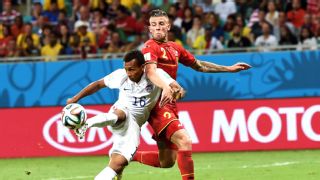|
There can be no greater experience for a youngster than the taste of a World Cup, apparently. Back in 2006, Sven-Goran Eriksson told us that he "just had a feeling" when selecting 17-year-old Theo Walcott for England's World Cup squad before he had even made his Premier League debut for Arsenal. In poor Walcott's case, we still don't know whether the trip gave him something to build on in terms of major tournament finals. He wasn't picked in 2010, and when he was nailed on to be selected this time, he suffered an injury which ruled him out. So we're left to focus on this year's Walcott: Bayern Munich's Julian Green. Even excepting that delicious mis-hit against Belgium that rippled Thibaut Courtois' net, Green is assumed to have gained invaluable insight into the top level of international football after Jurgen Klinsmann preferred him to Landon Donovan. Whether that actually is the case remains to be seen and is evidently not a question that will be answered quickly. The United States, like England, are particularly given to clinging to shoots of promise for future tournaments, with both nations harbouring extensive concerns about player development (in admittedly differing contexts). Roy Hodgson, or whoever guides England to Russia four years from now, will hope that the hard knocks of this tournament have helped Ross Barkley, Raheem Sterling and the country's best prospects grow. Yet we have to ask what value it will really have in terms of "experience." Whatever we can be sure to expect in Russia, it's that context and circumstance will be very different. One now-infamous article from early 2003 outlining why England would win Euro 2008 is periodically tweeted as a mocking riposte to optimists looking to the future; the author, BBC Sport's Dan Warren, had boldly predicted England would sweep others aside in Poland and Ukraine, using a 3-5-2 formation built on a backline of Rio and Anton Ferdinand together with then-Blackburn centre-back Martin Taylor. Those who lampoon it miss the fact that Warren made plenty of reasonable calls to add to the headline speculative ones -- Wayne Rooney and Michael Owen were his forward partnership, Ashley Cole and Steven Gerrard were linchpins -- but it simply goes to show how wildly speculative it is to project forward four years or so in international football. The most tragicomic aspect of Warren's harshly pilloried piece is that England didn't even qualify for Euro 2008, of course. New blood can work out at a major tournament, and a World Cup. Unlucky semifinalists the Netherlands are a fine example of youth succeeding, albeit with a team spearheaded by experienced, world-class forwards in Arjen Robben and Robin van Persie. Yet there are two elements of qualification to the Dutch outlook in this edition of the competition. Firstly, there is Louis van Gaal. His very raison d'être means staying heavily committed to the use of young players, be it at club or country level, so the makeup of this squad reflects a personal rather than an institutional philosophy. Secondly, most of the members of the Netherlands squad who are experiencing a first World Cup are no tournament greenhorns. Seven of last year's European Under-21 Championship semifinalists were in the squad for Brazil this time, so they knew the landscape, even if the stakes were higher. Their presence this summer is a triumph for continuity, as well as a tribute to a depth of talent. If only it worked like this for all nations. One senses that a smattering of youth is an easy option to suggest a proactive attitude. It could also be a fear of going stale, as Portugal have, for example, with consistency and stability morphing into inertia. If their coach Paulo Bento had been bothered about perceptions, he would have made Lyon's promising 23-year-old Anthony Lopes his third-choice goalkeeper instead of the reliable, more senior Eduardo (and he probably should have). It's not all about the future though, and nor should it be. The World Cup is something that is there to be won and as such, the here and now is arguably of far greater consequence than succession planning for a future that could be as alien as an iPad would be to Marty McFly. In terms of longevity and building for the future there would have been no place in this World Cup, for example, for two of its more admirable performers. Luiz Felipe Scolari flew in the face of much widely-held wisdom in keeping the faith with Julio Cesar throughout the goalkeeper's travails with Queens Park Rangers, before that late move to Toronto. One of the few largely blameless in the last four capitulation to Germany, Cesar repaid Scolari's faith with a very good tournament. Martin Demichelis played more in the campaign just gone, but took his share of stick during it. Recalled for Federico Fernandez in Argentina's last two games, the Manchester City centre-back has been outstanding, and should retain his place for Sunday's final. How many people would have backed Demichelis starting the showpiece as recently as February, after that Champions League red card against Barcelona? It just goes to show that "feeling," as Sven would have it, has probably more to recommend it in terms of selection for the World Cup than in any other context -- whether attempting to squeeze more out of veterans or betting heavily on a tyro. The reality is that there are other, far less palatable World Cup selection gambles taken tournament after tournament. England have done their fair share of closing their eyes and hoping for the best in the past with David Beckham and Wayne Rooney. Few have forgotten the painful sight of a bandaged Zinedine Zidane creaking through France's 2002 World Cup wake against Denmark in Incheon. Seeing youngsters let loose in a World Cup is a wonderful sight. Just don't expect it to mean too much four years down the line.
|

